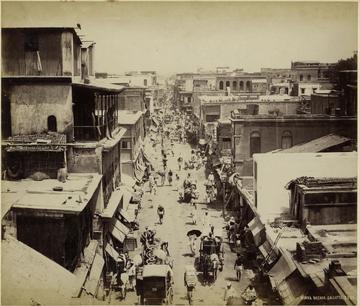
Burra Bazaar Calcutta, c 1880s
Social History of Colonial India: 1800-1947
Convenor: Dr Anwesha Roy
Studying the social history of India is as complex as it is interesting. We will interrogate what we mean by ‘social’ history, the multiple layers within it and how we write such histories. These questions will be posed through the course with reference to several interconnected historical processes (how the social is impacted by political and economic and vice-versa) and the question of ever-changing identities lies at the heart of much of the debates in the course. Classes are organised around a number of themes: changing environments, caste, religious reform, gender, nationalism and decolonisation. Topics to be covered within the thematic clusters include: technological change, urbanisation, the making of peasant societies, colonial knowledge and colonial law, Christian, Hindu and Muslim religious change, ethno-linguistic and religious movements, Gandhi and mass nationalism, and of course, Partition and its experience. This paper will give students a chance to explore the longer-term history of social relations in different parts of colonial India and their changing forms in the present day.
Take a look at…
Sumit Sarkar, Writing Social History (Oxford University Press, Delhi, 1997)
Francesca Orsini, ed. 2006. Love in South Asia: A Cultural History (Cambridge: Cambridge University Press)
Joya Chatterji, Bengal Divided, Hindu Communalism and Partition 1932-1947 (CUP, 2010)